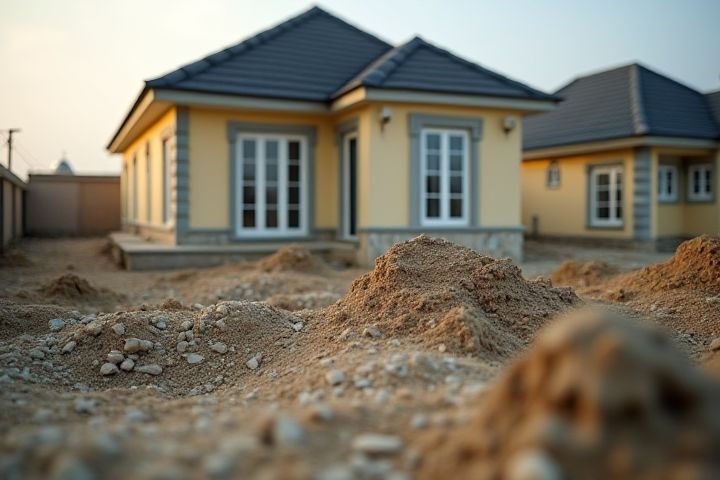
Real estate in Nigeria is experiencing significant growth, driven by urbanization and increasing population demand. Major cities like Lagos and Abuja offer lucrative investment opportunities, with residential, commercial, and industrial developments expanding rapidly. The Nigerian government has implemented policies to enhance property ownership, including affordable housing initiatives and reforms in land acquisition processes. Key factors for successful investment include understanding local market trends, navigating the regulatory landscape, and assessing property values. Engaging with local realtors and utilizing online platforms can also aid in finding prime real estate opportunities tailored to your investment needs.
Rapid urbanization
Rapid urbanization in Nigeria has significantly transformed the real estate landscape, leading to a surge in demand for residential, commercial, and industrial properties. Major cities like Lagos, Abuja, and Port Harcourt are experiencing an influx of people migrating for better opportunities, resulting in increased housing projects and infrastructure development. As urban populations grow, developers are prioritizing affordable housing solutions to meet the needs of low- and middle-income earners. This dynamic environment presents both challenges and opportunities for investors seeking to navigate the evolving market and cater to the diverse needs of urban dwellers.
Diverse property markets
The real estate market in Nigeria showcases a diverse range of properties, including residential, commercial, and industrial sectors. Urban areas such as Lagos and Abuja are thriving with high-rise apartments, luxury homes, and expansive office spaces that cater to a growing population and business sector. The emerging trends in property development emphasize sustainability, with developers increasingly incorporating eco-friendly materials and smart technologies in new projects. For investors, understanding regional dynamics and property types is crucial for making informed decisions in this evolving landscape.
Opportunity for foreign investment
Nigeria's real estate sector presents significant opportunities for foreign investment, driven by urbanization and a growing middle class. With major cities like Lagos and Abuja experiencing rapid population growth, the demand for residential, commercial, and industrial properties is on the rise. The government's initiatives, such as the National Housing Policy and incentives for investors, further enhance the appeal of investing in Nigeria's real estate market. You can capitalize on this burgeoning sector by exploring partnerships with local developers and leveraging technology in property management.
Regulatory frameworks
The regulatory frameworks governing real estate in Nigeria are pivotal in shaping market dynamics and ensuring transparency. Key legislation, such as the Land Use Act of 1978, dictates land ownership and use, while agencies like the Federal Housing Authority oversee development policies and regulatory compliance. You should be aware that zoning laws and environmental regulations play crucial roles in determining property value and development potential. Robust enforcement of these regulations is vital for attracting local and foreign investment, fostering sustainable growth in Nigeria's real estate sector.
Land Use Act
The Land Use Act of 1978 is a pivotal legislative framework governing real estate development and land administration in Nigeria. It allocates land ownership to state governments while granting individuals the right to use land through a leasehold system, typically not exceeding 99 years. This act is crucial for regulating property transactions, ensuring that land is utilized efficiently and accessibly for residential, commercial, and agricultural purposes. Understanding the implications of the Land Use Act is essential for navigating Nigeria's complex real estate landscape, whether you are an investor, developer, or prospective homeowner.
Building approvals process
The building approvals process in Nigeria is a critical component of the real estate sector, designed to ensure compliance with urban planning regulations and safety standards. Developers must submit detailed architectural plans and environmental impact assessments to relevant authorities before receiving a permit, which can vary significantly across different states. Timely acquisition of building approvals not only facilitates project commencement but also enhances property value by ensuring adherence to legal frameworks. Understanding this process is essential for investors and developers aiming to navigate Nigeria's dynamic real estate market successfully.
Population growth drivers
Nigeria's real estate market is significantly influenced by population growth, which is fueled by urban migration, higher birth rates, and economic opportunities in metropolitan areas. As cities like Lagos and Abuja expand, the demand for residential, commercial, and industrial properties continues to rise. This influx creates a lucrative environment for investors looking to capitalize on emerging neighborhoods and infrastructure developments. Understanding demographic trends and their impact on real estate can help you make informed investment decisions.
Infrastructure development
In Nigeria, real estate is increasingly driven by infrastructure development, which plays a crucial role in enhancing property value and attracting investments. Urban areas are witnessing significant improvements in transportation networks, utilities, and public facilities, leading to a surge in demand for residential and commercial properties. Projects like the Lagos - Ibadan Expressway and the expansion of the Abuja Metro Rail significantly enhance accessibility to various regions. Investing in real estate now allows you to capitalize on the ongoing growth and transformation shaped by these critical infrastructure developments.
Rising housing demand
Rising housing demand in Nigeria is driven by population growth, urbanization, and an expanding middle class seeking quality living spaces. The real estate market presents opportunities in residential, commercial, and retail properties, catering to diverse needs from affordable housing to luxury developments. Government initiatives and reforms aimed at improving infrastructure and affordability further enhance investment prospects. For potential investors, understanding the dynamics of regional markets like Lagos and Abuja is crucial to capitalize on this growth trend effectively.
Property financing options
Property financing options in Nigeria encompass a variety of methods tailored to assist you in acquiring real estate. These include traditional mortgages from banks, which typically require a down payment, and are offered at competitive interest rates. Other alternatives include cooperative housing schemes, where groups pool resources to facilitate property purchases, and real estate investment trusts (REITs) that allow for fractional ownership. Additionally, government initiatives and programs aim to promote affordable housing financing for low and middle-income earners, making property ownership more accessible throughout the country.
